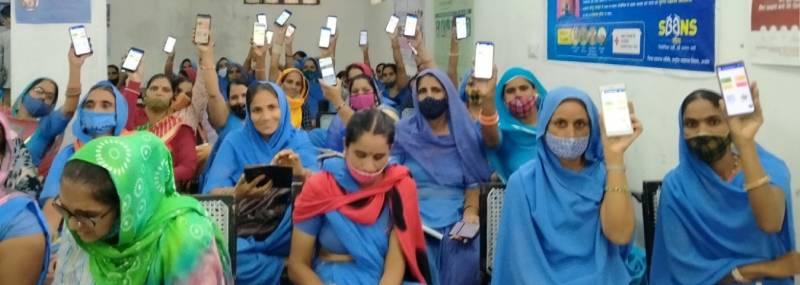New Delhi: The state of Rajasthan’s focus on digital integration to strengthen health services delivery is transforming lives and empowering frontline workers.
To address challenges of maintaining paper-based records, Rajasthan launched ASHA Soft, an online system for processing payments and monitoring the work of ASHAs—frontline health workers who connect communities with public health services.
In 2022, the State ASHA Cell began using the Pregnancy, Child Tracking and Health Services Management System (PCTS) app to manage service-related incentives for ASHAs and health-related work by frontline workers.
Building on this, the State Noncommunicable Diseases (NCD) Cell integrated incentives for ASHAs involved in screening and follow-ups of NCDs, through the linked ASHA Soft-PCTS platform, thereby enabling streamlined, transparent and data-driven management. A key addition was the use of the Ayushman Bharat Health Account (ABHA)—a unique 14-digit digital health ID—into the platform, allowing secure, paperless linkage and real-time tracking of health records across all levels of care.
In 2024, after successful pilots in selected districts supported by WHO and partners, this new system was rolled out. Initially used for routine incentive-based payments to ASHAs, the PCTS platform was expanded to include NCD-related incentives and successfully migrated to ASHA Soft.
“By linking ASHA Soft with NCD incentives, Rajasthan has set a benchmark for efficiency and empowerment. This initiative ensures timely payments, boosts accountability, and strengthens the continuum of care for our people,” says Dr Amit Kumar Yadav, Mission Director, National Health Mission, Government of Rajasthan.
The rollout deployed a systems-approach emphasizing capacity building, performance reviews, feedback on the new features and district-level ranking under India’s National Programme for Prevention and Control of Non-Communicable Diseases (NP-NCD) to motivate healthy competition. A key policy decision of one-time data entry was capturing both initial screening and follow-ups for the previous 12 months since the launch, to improve data accuracy and recognize efforts made by ASHAs, proved to be game changer.
“Rajasthan’s experience in integrating digital platforms for service delivery and financial inclusion has enhanced operational efficiencies—enabling faster patient follow-ups, better monitoring and support, and measurable health system impact,” says Ms. Payden, Acting WHO Representative to India.
In just five months since its launch in November 2024, ₹29.5 million in payments were processed efficiently (till March 2025). This transformation raised digital incentive payouts from a little over zero in 2023–24 to almost ₹38 million in 2024–25, with over 75% disbursed after adopting the new feature.

ASHA workers attend a training session on digital payments at Pisanagan Block in Ajmer district of Rajasthan. (Photo: © WHO India | Sree Ram)
“ASHA Soft has revolutionized our payment system. Automation ensures timely payments, resolving previous delays,” says Dr Sunil Singh, State NCD Nodal officer, Medical Health & Family Welfare Department of Rajasthan.
WHO worked closely with state officials and other stakeholders to help shape policies and strategies for the digital integration of ASHA payments.
Comprehensive training programmes have empowered ASHAs to effectively use the new system—turning technology into a tool of empowerment rather than a barrier. Orientation sessions were conducted to train district ASHA coordinators on the new system, while regular reviews and feedback tracked payment progress and guided continuous improvement. WHO also supported the development of video tutorials in the local language to help ASHAs use the app and manage payment claims, thereby boosting its adoption.
“This initiative has given me the financial stability and confidence to continue working with dedication. The ease of digital payments has made a huge difference,” says Ms Meena Paliwal, an ASHA at the Sangath Kala primary health centre.
The digitization of ASHA payments in Rajasthan has improved both incentive delivery as well as NCD management, setting a model for health system efficiency and patient care.
